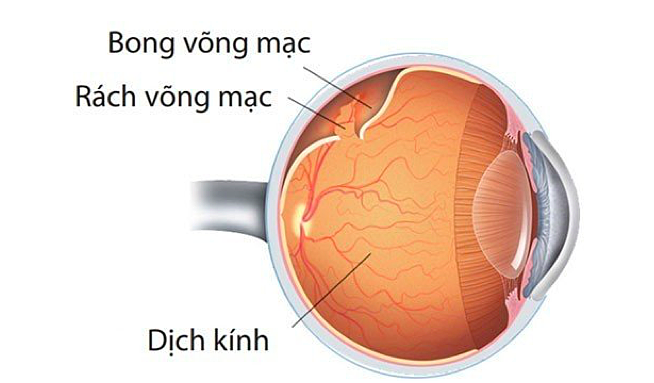Hanoi Blurred vision with black spots like flies, more than a month later the 40-year-old woman went to the doctor and found that her left eye was completely blind.
The patient was nearsighted in both eyes, with a diopter of -3.5. One morning after waking up, she noticed that her left eye was much more blurry. She thought it was because her nearsightedness had increased, so she did not go to the doctor. After two weeks, the blurred vision had not gone away and she started seeing black spots like flies. She went to the doctor and was diagnosed with retinal detachment.
"The patient underwent surgery to treat retinal detachment, but the condition was too severe and treatment was delayed, leading to permanent vision loss," said Dr. Mai Thi Anh Thu, Hanoi Eye Hospital 2, on January 12.
Retinal detachment is a medical emergency in which the nerve tissue (retina) at the back of the eye pulls away from its normal position. Early warning signs of retinal detachment include decreased vision, a feeling of missing a corner of the visual field, flashes of light, or the sudden appearance of floaters.
There are many causes of retinal detachment, factors that increase the risk include age (retinal detachment is more common in people aged 50 and over), family history of retinal detachment, severe myopia, trauma, and eye diseases.
Treatment for retinal detachment is usually surgical and takes several months to improve vision. Some cases may require 2-3 surgeries depending on the patient's condition and the doctor's instructions.

Simulated image of retinal detachment. Photo: Provided by the hospital
If detected early, the central part of the retina (macula) has not yet detached, and the eye will still have good vision after treatment. On the contrary, the outcome will be worse if the macula has detached, the longer the detachment before surgery, the lower the possibility of improving vision after surgery, which can lead to permanent vision loss like the patient above.
Retinal detachment is usually painless and is only discovered during a thorough examination. Signs include blurred vision, gradual loss of vision, or a curtain-like appearance of vision, sudden appearance of floaters, or flashes of light in one or both eyes.
"Many patients are subjective about blurred vision, thinking that it is due to increased nearsightedness without knowing that it can potentially lead to dangerous diseases," said Dr. Thu, adding that the longer the retinal detachment is left, the higher the risk of permanent vision loss in the eye.
Le Nga
Source link




![[UPDATE] April 30th parade rehearsal on Le Duan street in front of Independence Palace](https://vstatic.vietnam.vn/vietnam/resource/IMAGE/2025/4/18/8f2604c6bc5648d4b918bd6867d08396)

![[Photo] Prime Minister Pham Minh Chinh receives Mr. Jefferey Perlman, CEO of Warburg Pincus Group (USA)](https://vstatic.vietnam.vn/vietnam/resource/IMAGE/2025/4/18/c37781eeb50342f09d8fe6841db2426c)









![[Video] Ministry of Industry and Trade requires strict inspection of fake food, milk and medicine](https://vstatic.vietnam.vn/vietnam/resource/IMAGE/2025/4/19/190da04a17a343c79822b86326c48b4f)

![[Video] Doctors, pharmacists, and medical staff are not allowed to advertise functional foods.](https://vstatic.vietnam.vn/vietnam/resource/IMAGE/2025/4/19/f08666d51bdb40a495cc27e0ba1bbbfc)


















































































Comment (0)